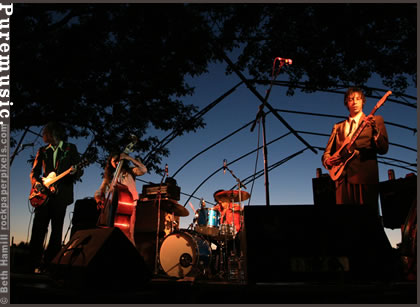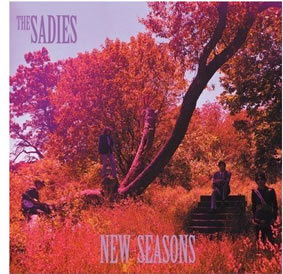
Dallas Good: Hello?
Puremusic: Hi, Dallas, Frank Goodman in Nashville. How are you doing?
DG: Fine, Frank. How are you?
PM: Great. It's been too long. I looked back in the issue where you last appeared, and it was three years ago--
DG: Oh, man, really? Well, yeah, that makes sense actually. That would have been around the time we put out our Favourite Colours record.
PM: Right. It was again like the advent of autumn. So how does autumn 2007 find you?
DG: Well, it looks good so far. It looks a whole lot like summer to me.
PM: How so?
DG: Well, it just didn't look like fall, looks like the middle of summer.
PM: Yeah, our fall is going to be all screwed up because it was too dry and too hot, and a lot of leaves fell off the trees already.
DG: Pardon the expression, but I guess you could say that we're all facing "new seasons."
PM: Right, exactly.
DG: So how you been? You doing well?
PM: Yeah, life is good, really good, no complaints. Going to Mexico in October, lots of new songs. That kind of thing.
DG: Ah, great.
PM: And you and Amanda [Schenk] are still in the city, right? [Toronto, that is.] How is she doing?
DG: She's doing great.
PM: I thought she took excellent photos again [for the cover of the new album].

DG: Oh, I will tell her that, thank you very much. Yeah, this one, we definitely had the photos in mind exactly, with a small margin of error.
PM: Yeah. Because, again, I'm working with advance copies, and on some of the publicity you see black and white versions of the photos that are intended, but I'm excited to see the final art, of course. And I'm reminded when I looked back at the other interview that, man, I meant to contact her to get prints of some of her photos, pay her to do some stuff for me. I wonder--
DG: Well, she'd love to. She's the last of a dying breed at this point.
PM: Of people who actually do prints.
DG: Yeah, exactly. And from film negatives and--
PM: Wow.
DG: Absolutely. The one catch with shooting film is there's not a whole lot of options to choose from. We were just laughing about how on the latest record we use the Hasselblad camera and I think she shot a total of 12 photos for the entire photo shoot--no, it would be 15, I guess.
PM: Oh, my God. [laughs]
DG: So it's just kind of funny, because of course now in the digital world in the same amount of time you could have done 3,000 with a similar result, if not inferior. But of course, with that comes a whole lot of little tiny hoops you got to jump through. I know she'd be flattered by any sort of contact, though.
PM: I just talked to Travis, and so I asked him some things--we talked about Gary Louris, that was an inspired choice, and I thought he did a really good job.
DG: Oh, yeah, it was great--calling it an inspired choice is an excellent expression, because he kind of chose us in a lot of ways, too. After touring with the Jayhawks, he was quick to contact me and just say that he was enthusiastic. We became really good friends. And for the longest time we would have filed each other under the sort of "one day" or "rainy day" category. And it turned into calling each other every month and saying, "Next month, next month, next month." It was just so amazing because he's got so much on his plate, too. And the fact that he knew he could do something with us was flattering and interesting. But then from there--we had no idea which way it would work, but we just also didn't really care. We just figured we got nothing to lose by hooking up with our buddy in Spain at a time when we're already on tour. It was very cost efficient. And then we really, really enjoyed the process. We quickly made him one of five.
PM: Wow. I feel like I know Paco Loco now--I mean, my buddy Brad Jones makes records down there, and Josh Rouse. And I've talked with both of them about Paco Loco's, and have written about him in Puremusic now several times.
DG: Oh, he's unbelievable to work with.
PM: That's the place to go.
DG: Somebody with unrelenting incredible sense of humor is so rare when you're working 13, 14 hour days, or whatever.
DG: Right.
PM: He was the perfect man for the job--and also for breaking the ice with us and Gary--just creating a palette or platform, whatever you want to call it, for making a record.
PM: What is his recording platform down there? Has he got a Protools setup down there?
DG: Absolutely not. That was the other thing.
PM: He's an analog guy.
DG: Yeah. So we were instantly comfortable when we showed up there to see like a Studer tape deck and Cadac desk and all of the analog effects that we have ever come to rely on.
PM: Really?
DG: And we mixed them onto half-inch. Yeah, for my taste, I couldn't pick a better studio. And the thought of having to go to the south of Spain to find it is ironic. It's very homespun. I don't know if any other engineer could operate his studio, but I know that I wouldn't want to work with any other engineer.
PM: Yeah, and I thought it was funny that Muni got credited for catering on a number of the songs.
DG: She did. Unfortunately there's a last name typo.
PM: Oh, really?
DG: She's listed as Muni Paco, and not Muni Loco.
PM: Oh, she got his first name for her last name?
DG: Yeah.
PM: Oh, well.
DG: But whatever. But yeah, Muni was amazing. She sings on the record. And she was just an absolutely--you know, when you're basically in one room for the duration, for days and days on end, anybody in the compound becomes a part of the process. Yeah, I couldn't imagine doing it without Muni, for that matter. Again, I've never found such generous and intelligent people that I could immediately feel that I could relate to. Psychology is half the battle with finding an engineer and a place to do it.
PM: Yeah, because it's all about atmosphere, it's all about the vibe.
DG: Exactly. For us, it didn't feel like we were in Spain, it just felt like we were in a very unique setting making a record, because we were working long hours. We only did half of the record out there.
PM: Right. You did the other half at home, right?
DG: Yeah, with Gary. So again, the emphasis, I guess, was just sort of on a comfort level, and a concept that we had nothing to lose.
PM: Yeah, right. And hey, it turned out really good, as usual.
DG: Thank you.
print (pdf) listen to clips puremusic home